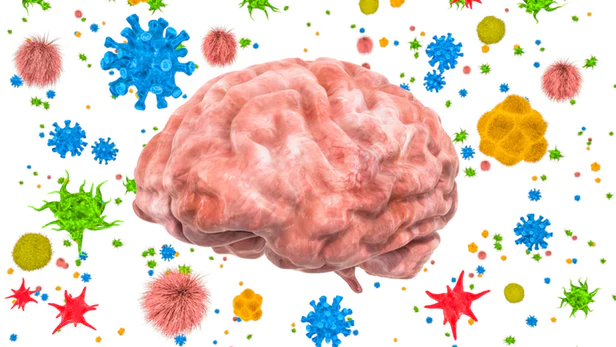Gut bacteria found to help protect brain and central nervous system from harmful viruses

Gut bacteria found to help protect brain and central nervous system from harmful viruses
MEDICAL 19 hours ago
19 hours ago
New research affirms the importance of maintaining a healthy gut microbiome(Credit:alexlmx/Depositphotos)
A compelling new study has described a novel association between viral infections, neurodegenerative disease, the gut microbiome, and our immune system. The research suggests gut bacteria disruptions can allow harmful viruses to trigger neurological diseases such as multiple sclerosis.
A growing body of research is hypothesizing viral infections of the central nervous system (CNS) to be fundamentally related to the onset of a number of chronic neurological and psychiatric disorders. Alzheimer's, Parkinson'sand multiple sclerosis have all, at some point, been implicated as initiated by a CNS viral infection.
We also are increasingly realizing the diverse population of bacteria residing in our gut seems to be fundamentally interlinked with our immune system. For example, recent research has found antibiotics can significantly disrupt our gut microbiome, resulting in everything from impairing the efficacy of vaccines to enhancing the spread of a flu infection.
This new study, from the University of Utah School of Medicine, set out to examine what role the gut microbiome could be playing in the onset of neurodegenerative disease.
"We wanted to investigate whether gut microbes could alter the immune response to a virus in the central nervous system and whether this affects the amount of damage the virus causes," explains David Garrett Brown, one of the lead authors on the new study.
To begin, the researchers looked at two different groups of mice, both infected with a specific strain of hepatitis virus known to result in acute encephalomyelitis. This animal model is found to resemble neurodegenerative symptoms similar to those seen in multiple sclerosis. One group of mice was raised with a healthy microbiome, while the other group was subjected to various microbiome disruptions, including doses of antibiotics known to eliminate many gut bacterial populations.
Those mice with the disrupted microbiomes displayed significantly weakened immune responses to the hepatitis virus, and ultimately showed worse signs of neurodegeneration, including paralysis. Interestingly, those mice with disrupted microbiomes also showed less active brain immune cells, called microglia, than the healthy mice.
Taking the research one step further, the team homed in on what mechanism the gut bacteria could be using to enhance the activity of microglia in the CNS and brain. Experiments revealed one particular immune signaling protein, called TLR4, seemed to be the key to this process. To confirm the hypothesis that microglia activity can be enhanced through TLR4 signaling from the microbiome, the researchers administered TLR4 to virally infected mice with disrupted microbiomes. And, amazingly, the animals indeed showed reduced neurological damage from the virus.
"We've shown that gut microbes protect infected mice from paralysis by turning on a specific pathway in central nervous system cells," says June Round, co-senior author on the study. "This suggests that signals from microbes are essential to quickly clear viruses in the nervous system and prevent damage from multiple sclerosis-like diseases."
Of course, this research has only been demonstrated in animal experiments at this stage, and there are many unresolved questions, such as which particular gut bacteria species could be responsible for this specific TLR4 signaling. Much more work is needed before these nascent ideas are translated into human clinical treatments, but Round says what we do know for sure is that antibiotics can disrupt our vital gut bacteria population, and doctors should be considering ways to repair these disruptions.
"Our results emphasize the importance of maintaining a diverse community of bacteria in the gut, and that interventions to restore this community after taking antibiotics may be necessary," says Round.
The new study was published in the journal eLife.
Source: eLife


